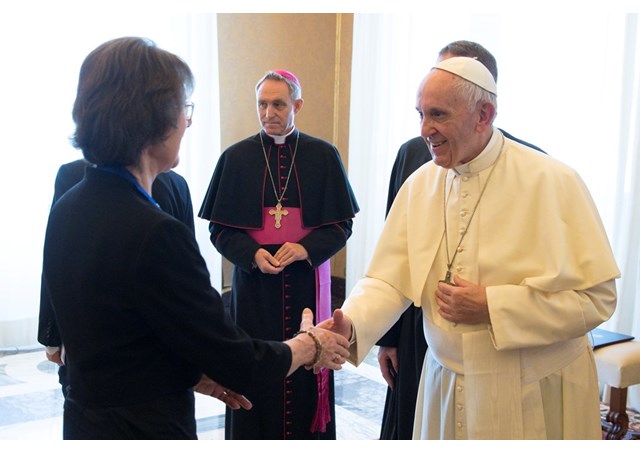
Pope meets Methodists: grandchildren of the Reformation

(Vatican Radio) As “grandchildren of the Reformation”, Methodists never experience a split from Rome and the two Churches have learnt much from each other’s traditions over half a century of ecumenical dialogue. That’s the view of Gillian Kingston, vice-president of the World Methodist Council, who was among those meeting with Pope Francis in the Vatican on Thursday.
The papal audience included members of the Methodist-Roman Catholic International Commission who are marking fifty years of dialogue, as well as the five hundredth anniversary of the Protestant Reformation.
Vice-president Kingston is a member of the Irish Council of Churches and served on the international dialogue commission for two decades from 1986 to 2006. She talked to Philippa Hitchen about the history of Methodist-Catholic relations…
She notes that the Methodist-Catholic Commission was “arguably the first international commission established in the wake of Vatican II” and since then has been picking up on themes of interest to both sides.
Historically, she says, there was never a breaking point between Methodist and Catholics. Unlike Lutherans and Anglicans, she adds, Methodists see themselves as “grandchildren of the Reformation so we don't have any history, any doctrine, any event” to resolve.
Common sense of holiness
Instead, she says, we have in common a sense of holiness, not meaning “we’re so heavenly minded that we’re of no earthly use, but rather it is a dedication to God and to the work of God”.
Through the dialogue, Kingston says, each side learns to appreciate the other’s traditions, so Catholics are interested in the Eucharistic hymns of John and Charles Wesley because “they see a Eucharistic theology which resonates with their own”.
Emphasis on scripture and laity
From the Catholic Church, she adds, Methodists learn about the importance of structure and “leadership to which all may look”, while they can offer Catholics an emphasis on scripture and the importance of involving lay people.
Most people at local level, Kingston says, don’t know about the fruits of this dialogue, despite a focus in the first ‘Denver’ document of 1971 on the need to “to permeate to pew and the pulpit, the seminary and the church”. There is still a real need to break “a glass ceiling” to ensure that the documents can bear fruit at the local level.
Dialogue must permeate pew and pulpit
Finally she notes that one of our themes the World Methodist Council has adopted for the next five years is a focus on the poor and marginalized. Pope Francis, she says, has been “a wonderful leader for people of all faiths and none”, especially through his document Laudato Si’ about the interconnectedness of people and our planet.
| All the contents on this site are copyrighted ©. |


